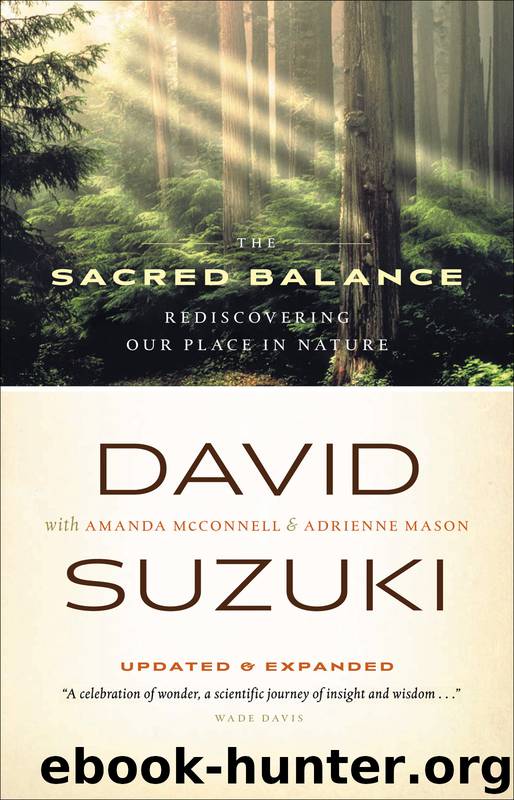The Sacred Balance by David Suzuki

Author:David Suzuki [Suzuki, David]
Language: eng
Format: epub
Tags: NAT000000
Publisher: D & M Publishers
Published: 2002-03-16T16:00:00+00:00
* * *
Tinkering with Life
One of modern biology’s great insights has been the recognition that dna is the blueprint of life, dictating the physical makeup of all multicellular organisms. By elucidating its molecule structure as a double helix, Watson and Crick began a revolution that now allows scientists to create organisms virtually at will. Today, scientists can isolate, purify, sequence and synthesize specific genes and then transfer them between unrelated species. This ability has led to an explosive growth in biotechnology, wherein spectacular new organisms are created by gene transfer: strawberries resistant to frost because of an implanted fish gene that produces antifreeze; rice rich in blindness-preventing vitamin A; bananas implanted with genes allowing them to produce antibiotics. The list is only restricted by one’s imagination. The notion of creating designer organisms for human benefit is irresistible.
Biotechnology is trumpeted as a means to eliminate starvation and suffering by increasing yields for a growing human population, creating crops resistant to pests and generating new drugs. Yet the risks of genetically engineered organisms or their products, like the risks of DDT or CFCS when they were first introduced, are largely unknown, because our basic knowledge about how cells, organisms and ecosystems work is too limited to allow us to anticipate the repercussions of manipulating these organisms’ genes. The terrible error in biotechnology is thinking that genes exist and function in isolation. A gene is part of a greater, integrated whole—the genome—which has been selected and honed to turn off and on whole suites of genes in proper sequence and timing from fertilization to maturity, a network of gene relationships and connections we are just beginning to tease apart and reveal. A gene transferred from one species into another finds itself in a totally alien context leaving us little ability to anticipate consequences, much like removing Mick Jagger from the Rolling Stones and inserting him into the New York Philharmonic orchestra and asking him to make music. Sounds will emerge, but whether they will be music is unknown.
It is the context that makes a gene relevant. As, Richard Strohman, a biochemist and former Head of Molecular and Cell Biology at Berkeley, says:
When you insert a single gene into a plant or animal, the technology will work…you’ll get the desired characteristics. But you will also…have produced changes in the cell or the organism as a whole that are unpredictable…Genes exist in networks, interactive networks which have a logic of their own… And the fact that the industry folks don’t deal with these networks is what makes their science incomplete and dangerous… We are in a crisis position where we know the weakness of the genetic concept, but we don’t know how to incorporate it into a new, more complete understanding.
We live now in the “Age of Bacteria.” Our planet has always been in the “Age of Bacteria,” ever since the first fossils—bacteria, of course—were entombed in rocks more than 3 billion years ago.
STEPHEN JAY GOULD, “Planet of the Bacteria”
Download
This site does not store any files on its server. We only index and link to content provided by other sites. Please contact the content providers to delete copyright contents if any and email us, we'll remove relevant links or contents immediately.
The Lonely City by Olivia Laing(4783)
Animal Frequency by Melissa Alvarez(4442)
All Creatures Great and Small by James Herriot(4294)
Walking by Henry David Thoreau(3938)
Exit West by Mohsin Hamid(3807)
Origin Story: A Big History of Everything by David Christian(3677)
COSMOS by Carl Sagan(3603)
How to Read Water: Clues and Patterns from Puddles to the Sea (Natural Navigation) by Tristan Gooley(3444)
Hedgerow by John Wright(3338)
How to Read Nature by Tristan Gooley(3314)
The Inner Life of Animals by Peter Wohlleben(3294)
How to Do Nothing by Jenny Odell(3287)
Project Animal Farm: An Accidental Journey into the Secret World of Farming and the Truth About Our Food by Sonia Faruqi(3207)
Origin Story by David Christian(3184)
Water by Ian Miller(3166)
A Forest Journey by John Perlin(3053)
The Plant Messiah by Carlos Magdalena(2913)
A Wilder Time by William E. Glassley(2846)
Forests: A Very Short Introduction by Jaboury Ghazoul(2823)
